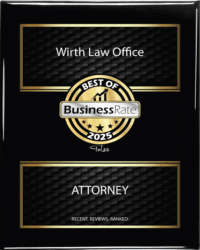Get an Attorney to Help You Withdraw Paternity
 Video Transcribed: I’m on the birth certificate, but I’m not the father. What do I do? I’m Oklahoma lawyer James Wirth, and that is the question that we have today.
Video Transcribed: I’m on the birth certificate, but I’m not the father. What do I do? I’m Oklahoma lawyer James Wirth, and that is the question that we have today.
If you are on the birth certificate of a child, you are not married to the mother, which means that an acknowledgment of paternity was signed. Most of the time that’s signed around the time of birth, and then that’s sent to DHS to update birth certificate records.
If you signed an acknowledgment of paternity, but you are not the father, what are you supposed to do? All right, well, there are a couple of different deadlines here. Obviously, time is always of the essence. So, the moment that you know that that’s not the case, or you suspect that that’s not the case, you want to get involved, get an attorney quickly in order to handle that because as the timeline goes on, it gets more and more difficult to deal with.
First thing, once there’s an acknowledgment of paternity signed, you’ve got 60 days to file to withdraw that. After that 60 days, you can’t withdraw that anymore. However, it then goes to a two-year deadline. Under that two-year deadline, which is statutory, you can find Title 10, section 7700-308. It provides that within two years after the acknowledgment is executed, you can request that it be set aside on the basis of duress or material mistake effect if that is done within two years.
Now, prior to this change in the law back in 2019, that was pretty much it. It was a pretty hard two-year rule. However, now the statute has changed and it allows up to essentially, once the child turns 18, you can do that determination or you can undo that presumption of paternity and get that birth certificate updated if you’re not actually the father. If, and there’s a lot of ifs here if you can prove fraud.
And fraud is defined by another statute for this purpose, it’s at Title 10, section 7700-102, and it defines fraud as follows, “Fraud means any intentional misrepresentation of a material fact that could not have been discovered with reasonable diligence and was reasonably relied upon.” Okay? So, that would generally mean if the mother was misrepresenting facts, lying to you in order to convince you that you’re the father and that you relied on those falsities when you sign the acknowledgment of paternity, that can be a fraud. But the burden is on the father to prove that fraud by clear and convincing evidence.
If you can do that, you got to file before the child turns 18. If you can prove by clear and convincing evidence that you only signed it based on a fraud that you were relying upon, then it still isn’t completely done. You then have to have the best interest hearing because sometimes having a non-biological father is still in the best interest of the child. Having that father may be better than having no father, and it goes by the best interest standard. What has the relationship been historical? Is there a tie there? Because you can still be the legal father, even if you’re not the biological father under some circumstances.
First, you show fraud with clear and convincing evidence. Then you show that it’s in the best interest to determine the actual genetic parentage. At that point, you can get an order for genetic testing that is done and determines whether the father is or not. And if it determines that you’re not the father, then you can get an order disproving paternity, and in order to update that birth certificate to get you off the birth certificate. So, it is definitely a process. And the main thing to know is if you have concerns about it, then maybe address those before you sign the acknowledgment of paternity. And if you did sign that acknowledgment of paternity, but then you have concerns, you want to address it as quickly as possible, speak with an attorney about that, about your specific circumstances as quickly as possible, because it gets harder the more time that goes on.
All right. If you got questions about that scenario, you’re dealing with that, you’re going to want to talk to a Tulsa paternity attorney about that privately, confidentially. To get that scheduled with somebody at my office, you can go online to MakeLawEasy.com.




























